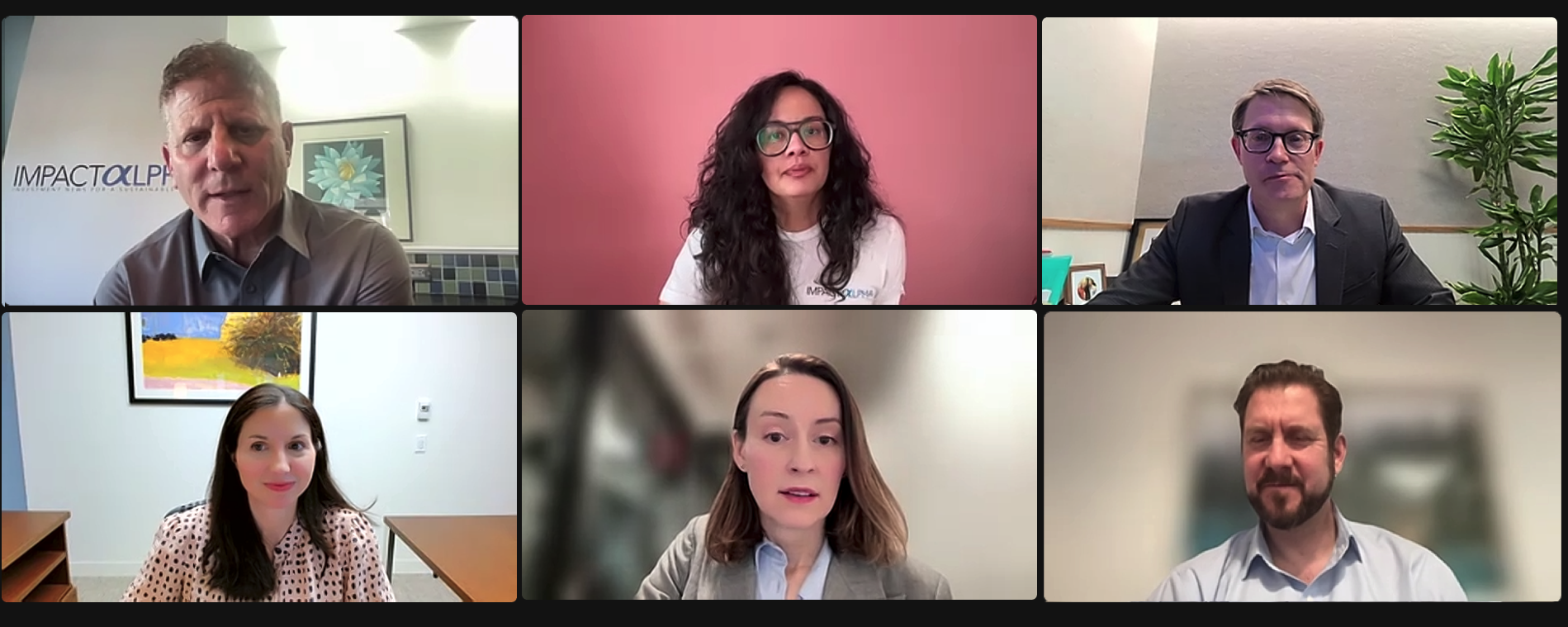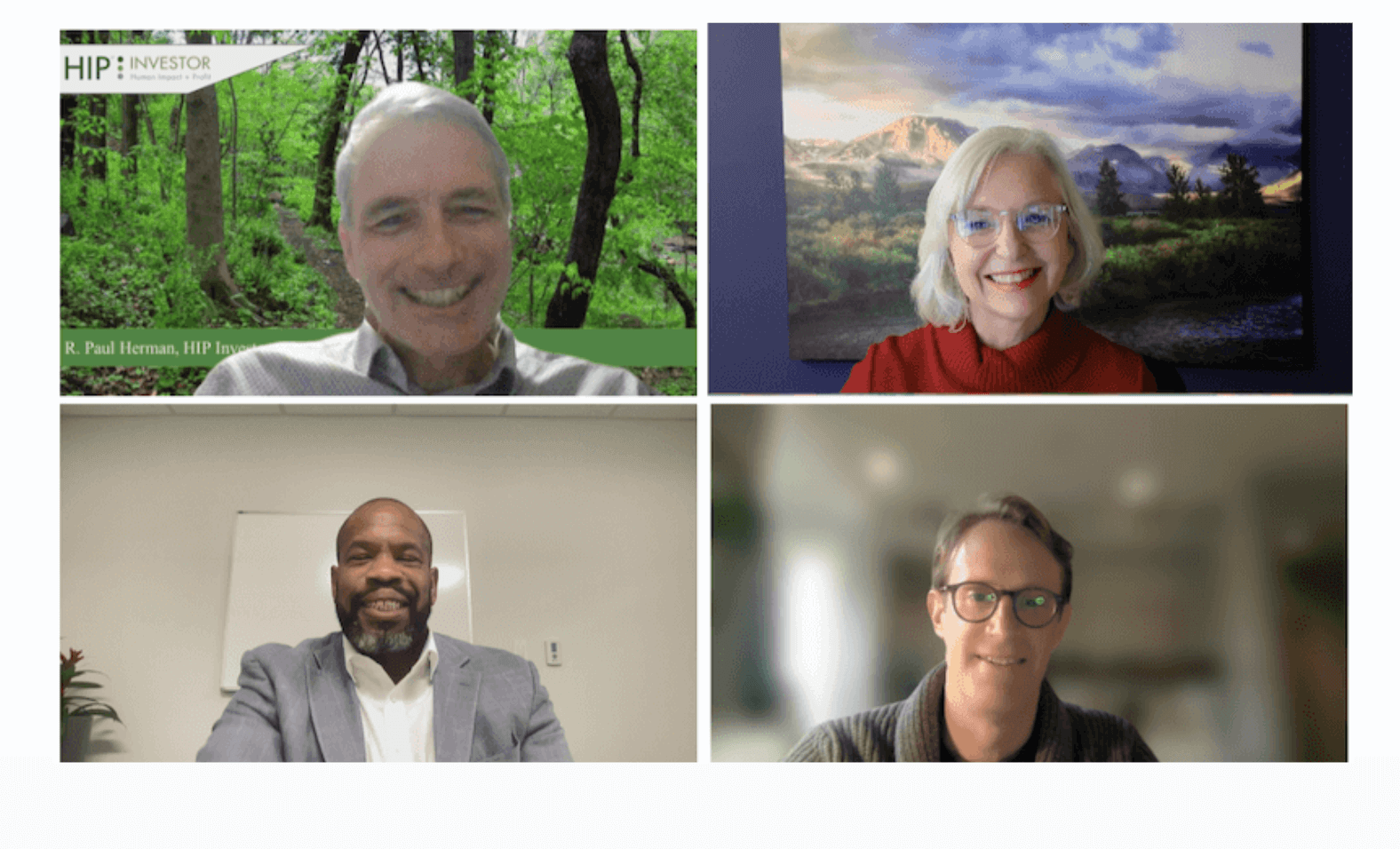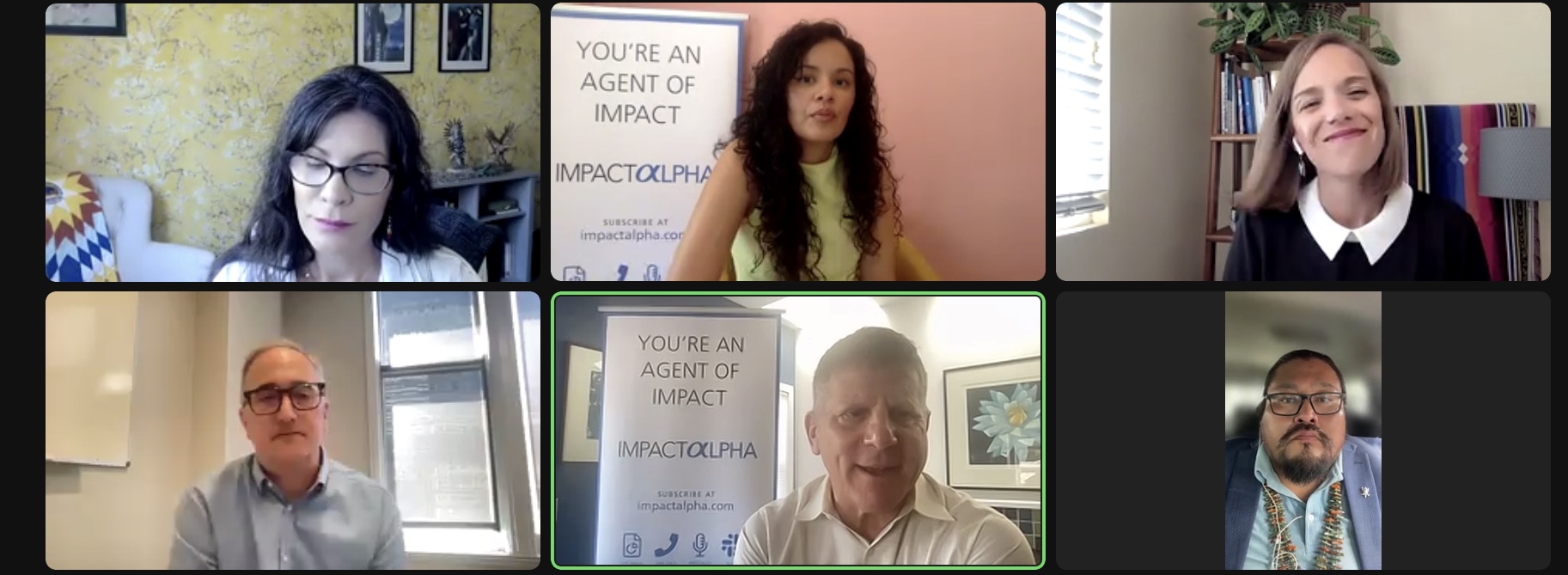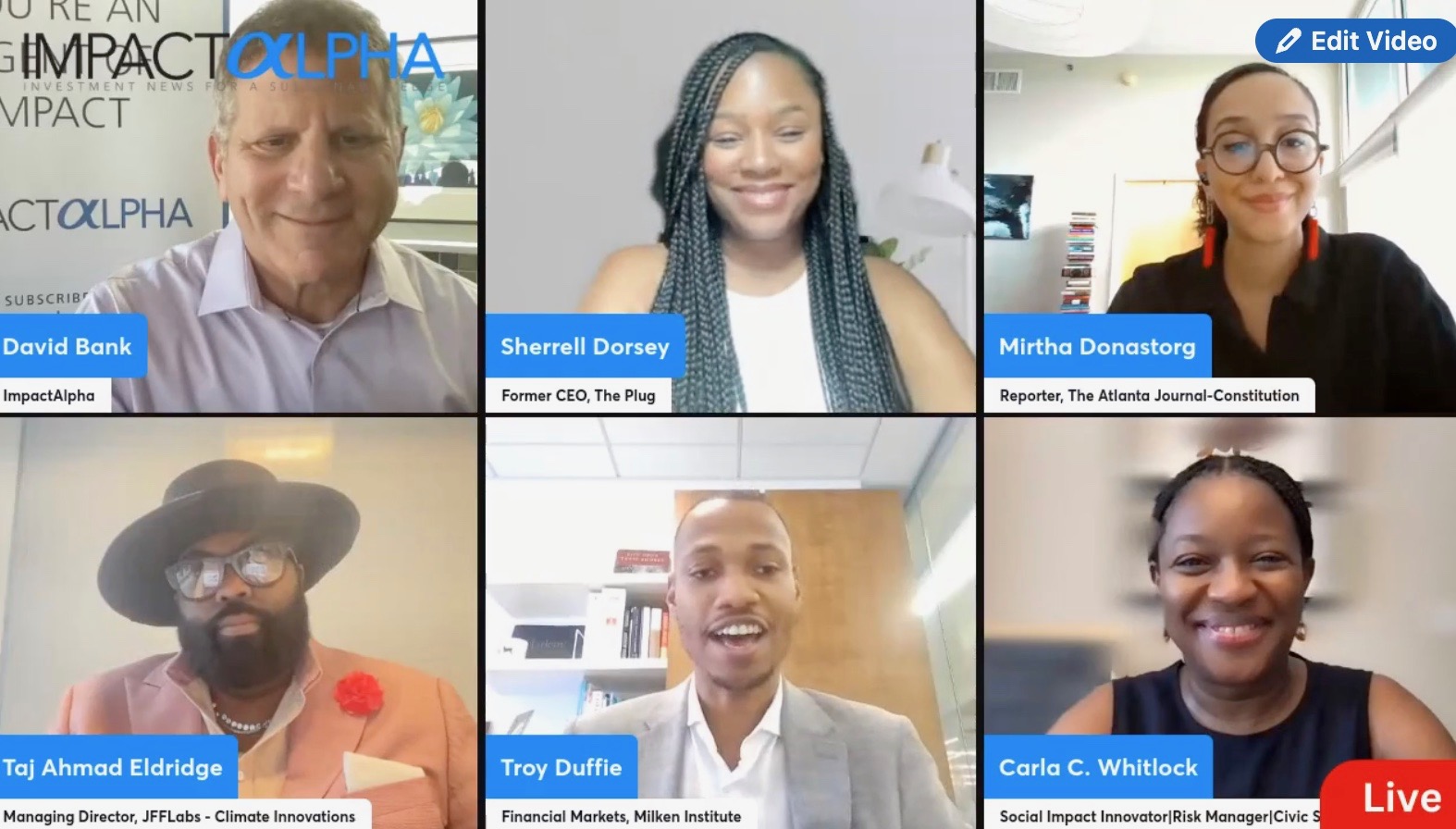ImpactAlpha, July 9 – Elevating the power (and wages) of low-income workers is not typically at the top of investors’ agenda. But a fairer distribution of productivity gains and economic growth may be just what capitalism needs, agreed participants on last week’s Agents of Impact call.
“Unless we have an economy that treats workers fairly it’s not going to help the investor class either,” said Leo Strine, who as chief justice of the Delaware Supreme Court until 2019 was effectively the top judge for U.S. corporations.
The Call, sponsored by Omidyar Network, took up the challenge of rewriting rules and designing policies for the stakeholder economy. We set up The Call last week with three pieces that traced the arc from stakeholder capitalism to worker power to racial justice. In coming months, additional Capitalism Reimagined calls on ImpactAlpha will dig into the role of investors and strategies to mobilize popular support for systemic reforms.
“We think the current manifestation of shareholder capitalism is broken,” Omidyar Network’s Chris Jurgens said to kick off the call. Jurgens leads Omidyar Network’s project, Reimagining Capitalism, to address the structural challenges at the heart of our economic system.
“We need to shift power and check power in the economy where it has become concentrated, and build power among those who have lacked voice, like workers and communities of color,” Jurgens said. “We need to shift the rules to put guard rails on market activity, and regulations that shape how investors and companies make decisions.”
Fair gainsharing
Workers are perhaps the first among the constituencies to be empowered by the new stakeholder capitalism. Strine, now of counsel at the law firm Wachtell, Lipton, Rosen & Katz, has laid out a broad reform agenda for what he calls “fair and sustainable capitalism.
That reimagined capitalism, he says, requires the restoration of workers’ share of economic growth and productivity increases to the levels that prevailed before about 1980, when the election of Ronald Reagan and the doctrine of “shareholder primacy” presaged a dramatic power shift. Fifty years ago, workers got a bigger share of profits; CEOs were paid less.
Strine advocated for expanding ESG investing to EESG to reflect the importance and value of employees. Practical reforms include expanding the mandate of board compensation committees to include equitable compensation schemes across enterprises. Workforce committees can elevate worker voices even at non-union companies.
Such advances can be protected with controls on corporate political spending and the adoption of public-benefit corporate structures that enshrine a positive duty to workers, communities, the environment and other stakeholders in corporate charters. Strine said disclosure and corporate responsibility rules need to apply to private companies as well as those that are publicly listed.
Strine argued that worker power can create new political coalitions and bridge divisions. “The best thing that corporate America and corporations can do for Black people in the United States is to pay all people a better wage. That will be a non-racially specific way of reducing inequality because it will have a disproportionately beneficial impact on Black people.”
“But the other thing that’s important is that there are a lot of struggling white communities out there, too, that demagogues appeal to,” Strine said. “If we change that gainsharing, if we go back to a fair distribution, that’s going to help those communities too. That’s going to build the center of our society.”
Curb-cut effect
After The Call, PolicyLink’s Michael McAfee joined ImpactAlpha’s Impact Briefing podcast to reflect on the discussion.
“It was refreshing to hear business leaders coming to the conclusion that we can strengthen our nation by continuing to evolve our economy to be more just and fair. That’s a rarity,” McAfee told host Monique Aiken. “The business sector has joined with civil society and the federal government to understand that that population, that 100 million, must be lifted up to the middle class and beyond.”
McAfee offered a rejoinder to Strine’s call for non-racially specific ways to lift up Black people by lifting up all workers. Legacy policies from lending to housing to agriculture to immigration are effectively race-based, he says, to the disadvantage and exclusion of Black people. Rather than broad policies that happen to benefit Black people, he argued for targeted policies that also provide broader benefits, in the same way that sidewalk curb cuts intended to facilitate wheelchair access have proved a boon for travelers with roller bags, parents with strollers and delivery workers with carts.
“You can’t close the racial wealth gap without significant public policy that targets Black and brown people, when you have excluded them from the gains,” he said on the podcast. “Talking about anti-Black racism is not about exclusion. It’s about wringing out those aspects of our founding that don’t serve us well today and, in wringing them out, ushering in a new era of prosperity that benefits everyone.”
PolicyLink’s Racial Equity Governing Agenda includes work with McKinsey & Co. to ensure that federal agencies are being truly transformative in fulfilling President Biden’s executive orders. With the Urban Institute, PolicyLink is creating a racial-equity scoring system for federal legislation. “What you are beginning to see us do is use the technical tools of democratic governance to do the more adaptive work,” McAfee said.
PolicyLink, along with Just Capital and FSG, has launched the Corporate Racial Equity Alliance and an updated CEO Blueprint for Racial Equity to suggest concrete actions that companies can take to fulfill the many pledges and commitments made after protests sparked by last year’s murder of George Floyd in Minneapolis. Among the most important: Lend your voices and your lobbying to support policies and practices that more capital toward justice.
“We’re now in a long overdue age of accountability, where corporate leaders need to deliver on their racial equity commitments and ensure equitable outcomes in all of their business activities,” said PolicyLink’s Mahlet Getachew.
Policy corner
Tangible community benefits are essential for building support for broader ‘stakeholder,’ reforms, said Fran Seegull of the U.S. Impact Investing Alliance. The Alliance’s policy agenda, Private Capital for Public Good, includes a dozen specific policy recommendations to catalyze more impact investments to help address urgent social, economic and environmental challenges.
The Community Reinvestment Act, for example, should be modernized to directly address racial disparities, she said. The CRA, originally passed in 1977 to respond to exclusionary redlining practices, required banks to equitably serve the communities in which they operate. Attacks on key provisions in the last administration have been at least partly reversed in the Biden administration. The White House and Treasury also are strengthening frameworks to lift up the essential role of community development financial institutions, or CDFIs in small-business lending and adapt to fintech and other innovations.
Likewise, a domestic development finance facility, modeled after the overseas work of the U.S. International Development Finance Corp., could play a role in supporting small businesses, financing infrastructure projects and nurturing entrepreneurial ecosystems. “We know that entrepreneurship is an essential path to wealth creation, and that Black, brown and women entrepreneurs are starved for investment capital,” Seegull said.
In partnership with the Alliance, ImpactAlpha has created a Policy Corner that pulls together dozens of articles and policy innovations.
The Alliance, along with the nonprofit B Lab, has spearheaded an effort to establish a White House Initiative on Inclusive Economic Growth, ideally to be housed within the National Economic Council, “to help the administration and Congress partner more effectively with the private sector to drive the kind of progress towards stakeholder capitalism, inclusive economic growth, community investing that we are talking about,” Seegull said. The coalition of more than 50 organizations includes PolicyLink, along with Strine and other participants on The Call.
Targeted universalism
In the discussion, 1863 Ventures’ Melissa Bradley came back to the thorny questions of targeted and universal policy designs. A growing number of thinkers and leaders are forging an integrated approach with what they’re calling “targeted universalism.”
“One of my concerns around these policies is that it is not until we recognize that Black women are the primary entrepreneurs, not white men, do policies and the allocation of capital starts to change,” said Bradley, a veteran of both the Clinton and Obama administrations. “If we continue to create policies that go for the majority, then I’m not included because I’m still only 12% of the population.”
“I’m all about the policies, but if they are not human centered on people who look like me, and not the people who create them, I fear that two years from now this is all for naught,” she said. “I think we’ve got to have individual solutions that focus on the people who look like me, strategies that are practical, and then those should be concretized in policy” that is grounded in the people closest to the problems and the solutions.
“I’m excited by this conversation, but my ulcer is a little ticking because I’m like, ‘Now what?’ And most importantly, ‘Where am I?’”











